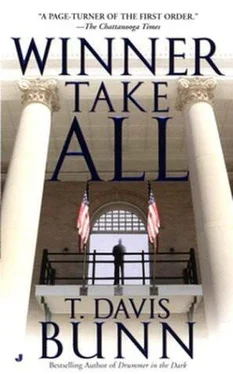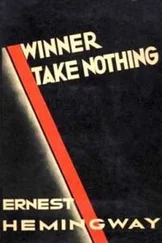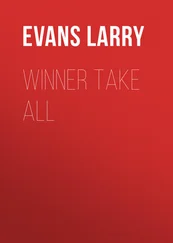T. Bunn - Winner Take All
Здесь есть возможность читать онлайн «T. Bunn - Winner Take All» весь текст электронной книги совершенно бесплатно (целиком полную версию без сокращений). В некоторых случаях можно слушать аудио, скачать через торрент в формате fb2 и присутствует краткое содержание. Жанр: Триллер, на английском языке. Описание произведения, (предисловие) а так же отзывы посетителей доступны на портале библиотеки ЛибКат.
- Название:Winner Take All
- Автор:
- Жанр:
- Год:неизвестен
- ISBN:нет данных
- Рейтинг книги:3 / 5. Голосов: 1
-
Избранное:Добавить в избранное
- Отзывы:
-
Ваша оценка:
- 60
- 1
- 2
- 3
- 4
- 5
Winner Take All: краткое содержание, описание и аннотация
Предлагаем к чтению аннотацию, описание, краткое содержание или предисловие (зависит от того, что написал сам автор книги «Winner Take All»). Если вы не нашли необходимую информацию о книге — напишите в комментариях, мы постараемся отыскать её.
Winner Take All — читать онлайн бесплатно полную книгу (весь текст) целиком
Ниже представлен текст книги, разбитый по страницам. Система сохранения места последней прочитанной страницы, позволяет с удобством читать онлайн бесплатно книгу «Winner Take All», без необходимости каждый раз заново искать на чём Вы остановились. Поставьте закладку, и сможете в любой момент перейти на страницу, на которой закончили чтение.
Интервал:
Закладка:
“Three days after the fire, I heard from her lawyer. A spiteful Raleigh man by the name of Hamper Caisse. The lawyer said that if I made any move at all, they would convene a court hearing to reveal how drunk I was the night of the fire.” The man spoke with the disjointed precision of addressing internal ghosts. “They’ll call witnesses from the fire department and the police. They will have people from my community reveal how my drinking has been a matter of concern. They will question how such a man could possibly be left with responsibility for a baby. He said if I’m willing to work things out amicably, then I need to show some patience.”
“But you think this offer is a lie?”
“Totally.”
“You are saying your former wife has abducted your child and now seeks to mask the fact through false representation?”
“That’s it exactly.”
“Why?”
“Excuse me?”
“You said she didn’t care for the child or contest your receiving full custody.”
“That’s right.”
“So what has changed?”
“I have no idea.”
“Before the events of that evening, when did you last speak directly with your former wife?”
“Almost a year ago. She left to sing in Paris and never returned. Finally I filed for divorce on the grounds of abandonment.” Dale Steadman scooted a manila file across the table and addressed Marcus directly for the very first time. “I hear you’re the patron saint of lost causes, Mr. Glenwood. I need just such a fighter in my corner.”
CHAPTER 4
The child’s mother and her mother’s mother have never gotten along. Somehow just being around the older woman is enough to fracture her mother’s immovable façade. When they are together, the old woman usually goes out of her way to say nothing. But a single smile toward the child, a word of quiet praise, and her mother begins a screeching tirade about meddling where she is not welcome. The child has only seen her grandmother twice in the previous four years .
But the child hears from her. Every birthday and Christmas, a card arrives with three tickets for some Broadway show. What happens to the tickets, the child has no idea. The child’s dreams of escape often center around the absent old woman .
Over the eight months leading to her thirteenth birthday, the child observes a change in her school friends. One by one they enter a different realm, a place that beckons with an allure as powerful as fury. They smirk together in the halls around school, giving little hand signs and one-word beacons that mean nothing to the child, except to show she is an outsider here as well. Until she is invited to join .
Four months before her thirteenth birthday, they invite the child to a sleepover. Her mother lets her go because the family is one of the most powerful in the city. Even her father, who pays almost no attention whatsoever to her activities, is impressed to hear where the child is spending the night. He starts in on his desire to have the man as a client. Her mother shuts him up with a single scathing remark .
After her mother drops her off, it takes the child almost half an hour to realize there are no adults home .
The child finds another couple of girls her age who look as lost and frightened as she feels. Together they move into a small corner of the living room, over by the blaring sound system. A movie is on the wall-sized television, but the picture is just meant for background lighting. There are almost three dozen girls tightly segregated into two groups-the majority are friends of the older sister, who is sixteen. The younger girls are barely tolerated. Especially after the boys arrive .
As the child watches, drugs and drinks spread around the room. Hash, pot, coke, speed, a new designer pill called ecstasy, wine, a couple of the older boys even bring champagne. This is a rich and generous crowd. Several times the boys come over to where the children crouch and urge them to have a toke, a sip, a dance. The older girls find this bitterly hilarious .
The child listens between the songs as other parents are scorned and dismissed. She sees the way others speak of their homes. She finds malignant comfort in not being so alone .
By the third party, it all seems pretty much normal .
Gradually her friends become restricted to girls from these gatherings. The child watches as one by one these friends allow themselves to be pulled into the game. That is what they call it, especially when around people who aren’t included. The girls who depart from the no-fire corner begin urging the child to come on and join the game. The child can’t say exactly why she resists. But it seems to her that they are becoming replicas of those they despise. Gay and lively on the outside, bitter and drugged within .
Even so, the child knows it is only a matter of time .
The night after her sixth game, she watches her parents with the detached interest of an eternal refugee. Their house is filled with a crowd of other false faces. The child helps the maid serve drinks and watches as her parents offer these strangers reptilian grins and chatter they do not even hear themselves. When the guests leave, her parents strip off the happy masks and reveal a steadfast hostility. They slide over to two opposing sofas, the last drinks charged like late-night ammunition. Her mother’s final cigarette adds to the smoldering cauldron. They snipe carefully, little wounding bullets that have been collected and charged over the night’s course .
Two nights later the child becomes trapped in a taxi with them. They are returning home from a party where the hosts had a clown act for the children, when a torrential downpour halts all traffic. For torturous aeons she remains locked between them on a seat that smells of a hundred thousand miles of angry chatter and thwarted dreams and rain splashing against the window. The child tries her best not to hear a thing. Just the same, she inspects herself afterward in the bathroom mirror, and is astonished to find she does not bleed from the wounds to her heart. As she lies in her bed that night, the child decides there is no reason not to go ahead and enter the game .
Then four days later, her grandmother dies .
At the reading of the will, which the lawyer insists the child attend, she learns that a trust fund has been set up in her name. An education fund, the lawyer calls it, to be released upon the child’s seventeenth birthday. One hundred and ten thousand dollars, every cent the grandmother has remaining after a long and lingering illness the child has not even known about. Her parents observe her with mute astonishment as the lawyer describes the precise terms of the child’s ticket to freedom. She is to have total control of the money. Until the release date, she has the sole right to determine how the funds are to be preserved. Although the child does not understand much of what is said, the lawyer’s words hold the delicate perfume of a foreign love song. She understands the most important thing, however. Silently she chants the phrase the entire way home while her parents fight viciously, for they have received nothing .
Total control .
The funds are moved into a passbook savings account. That night she calculates the amount of interest she will have accrued by her seventeenth birthday. She writes the sum down on a slip of paper. One hundred and thirty-seven thousand, four hundred and twenty dollars. She hides the paper in the back of her desk drawer, where she can take it out and look at it whenever she wants .
Two weeks later, she enters the school’s student counselor’s office and announces, “I want to graduate a year early.”
Читать дальшеИнтервал:
Закладка:
Похожие книги на «Winner Take All»
Представляем Вашему вниманию похожие книги на «Winner Take All» списком для выбора. Мы отобрали схожую по названию и смыслу литературу в надежде предоставить читателям больше вариантов отыскать новые, интересные, ещё непрочитанные произведения.
Обсуждение, отзывы о книге «Winner Take All» и просто собственные мнения читателей. Оставьте ваши комментарии, напишите, что Вы думаете о произведении, его смысле или главных героях. Укажите что конкретно понравилось, а что нет, и почему Вы так считаете.












